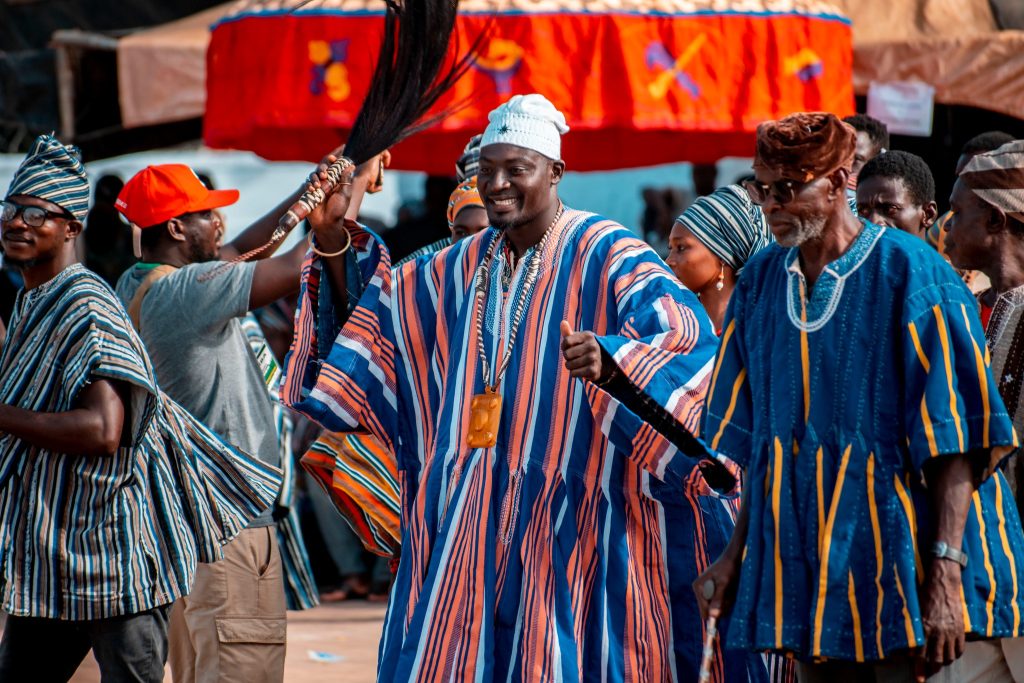
Discover the vibrant traditions of the Damba Festival in Northern Ghana, a celebration of chieftaincy, culture, and community unity.
Introduction
Northern Ghana bursts into vibrant celebration each year with the Damba Festival, a cultural event that unites communities through music, dance, and tradition. Rooted in both Islamic and indigenous customs, the festival honors the birth of the Prophet Muhammad while emphasizing the significance of chieftaincy and cultural heritage. From the rhythmic drumming to the colorful processions, Damba offers a unique glimpse into the rich tapestry of Ghanaian culture.
Origins of the Damba Festival
The Damba Festival traces its roots to the 17th century, initially commemorating the birth and naming of the Prophet Muhammad. Over time, the festival evolved to celebrate the chieftaincy institution and the cultural identity of the Mole-Dagbani people. Communities such as the Dagombas, Mamprusis, Nanumbas, and Gonjas observe the festival in the third month of the Islamic calendar, Rabia al-Awwal.
Evolution and Development
While the Damba Festival maintains its religious undertones, it has transformed into a grand cultural celebration. The festival spans several days, featuring events like:
- Somo Damba: The opening ceremony involving prayers and traditional dances.
- Naa Damba: A celebration honoring the king, marked by horse riding and regal displays.
- Belkulsi: The farewell procession that concludes the festivities.
These events showcase the community’s unity and the vibrancy of Northern Ghana’s cultural practices.
Cultural Significance and Community Impact
The Damba Festival serves as a platform for:
- Cultural Preservation: Passing down traditions and customs to younger generations.
- Community Cohesion: Bringing together families and communities to celebrate shared heritage.
- Economic Boost: Attracting tourists and stimulating local economies through cultural tourism.
The festival’s emphasis on chieftaincy reinforces the importance of traditional leadership in contemporary society.
Challenges and Contemporary Adaptations
Despite its significance, the Damba Festival faces challenges such as:
- Modernization: Balancing traditional practices with contemporary influences.
- Logistical Issues: Managing large crowds and ensuring safety during events.
- Cultural Dilution: Maintaining authenticity amid increasing commercialization.
Efforts are underway to address these challenges, including digitizing oral traditions and promoting cultural education.
Legacy and Modern Relevance
The Damba Festival remains a testament to the resilience and richness of Northern Ghana’s cultural heritage. Its continued celebration underscores the community’s commitment to preserving their identity and traditions. In an era of globalization, Damba serves as a beacon of cultural pride and unity.
Conclusion
The Damba Festival is more than a cultural event; it’s a vibrant expression of Northern Ghana’s history, traditions, and communal spirit. As it continues to evolve, the festival offers an opportunity for reflection, celebration, and the reaffirmation of cultural identity. Whether you’re a local or a visitor, participating in Damba provides a profound connection to Ghana’s rich cultural landscape.
FAQs
Q1: When is the Damba Festival celebrated?
A1: The festival is celebrated in the third month of the Islamic calendar, Rabia al-Awwal, which varies each year.
Q2: Who celebrates the Damba Festival?
A2: The festival is primarily celebrated by the Mole-Dagbani people, including the Dagombas, Mamprusis, Nanumbas, and Gonjas.
Q3: What are the main events of the Damba Festival?
A3: Key events include Somo Damba (opening ceremony), Naa Damba (king’s celebration), and Belkulsi (farewell procession).
Q4: How has the Damba Festival evolved over time?
A4: Originally a religious celebration, it has transformed into a cultural festival emphasizing chieftaincy and community heritage.
Q5: Can tourists attend the Damba Festival?
A5: Yes, the festival welcomes visitors and offers a unique opportunity to experience Northern Ghana’s cultural traditions.
RECOMMENDED ARTICLES
- Fetu Afahye: Cape Coast’s Grand Festival
- Akan Day Names: Identity in Every Birth
- apoo-festival-purification-and-culture-in-bono
- Kundum Festival: Harvest & Renewal in Ghana
USEFUL LINKS
